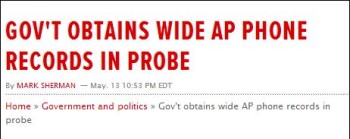
(Credit: AP , screenshot)
How many anonymous sources were put at risk by the Justice Department’s snooping into the Associated Press’s phone records?
The U.S. Justice Department got, without the Associated Press’s “knowledge,” two months’ worth of records for several AP phone lines as well as “more than 20 separate telephone lines assigned to AP and its journalists.” The AP only found out about the snooping May 10.
The AP said that it didn’t think its reporters’ “conversations were monitored,” but, the government did find out what numbers were called. According to the AP, calls made by “more than 100 journalists” during that period from April to May 2012 could have been tracked. These records would likely include contacts with sources who wanted to be anonymous. Given the number of journalists and phone numbers that were tracked, it would be surprising if anonymous sources weren’t discovered by the Justice Dept.’s snooping.
The Justice Department excused invading the AP’s privacy by claiming it could have compromised its investigation if it would have notified them in advance.
Concerns about Anonymous Sources
The AP quoted from a letter its CEO and president Gary Pruitt sent to U.S. Attorney General Eric Holder in which Pruitt cited the risk to anonymous sources and the “newsgathering” process. Pruitt wrote that the subpoena was an “overbroad collection” of records that could “potentially reveal communications with confidential sources across all of the newsgathering activities” at the time.
Further, Pruitt was concerned that the records could “provide a road map to AP’s newsgathering operations and disclose information about AP’s activities and operations that the government has no conceivable right to know.”
Did AP Story on Terror Plot Trigger Subpoena?
While “the government would not say why it sought the records,” the AP suggested the government wanted to find out who leaked information to the AP about “a foiled terror plot” that the AP reported on May 7, 2012. Under that theory, the government’s secret subpoena was exactly for the purpose of compromising AP anonymous sources.
The AP noted that the FBI had questioned CIA Director John Brennan about the leak. The subpoena the AP received included grabbing records for the AP staff who were involved in that story.
“Among those whose phone numbers were obtained,” the AP explained, “were five reporters and an editor who were involved in the May 7, 2012, story” on the plot.
The AP delayed publishing its story on the plot after a government “request” citing “national security.” Even when the AP did go to press May 7, the Obama administration wanted more time apparently so the government could scoop the AP’s reporting with “an official announcement” of its own.
The AP said it was surprised to have not received a request for records instead of being blindsided. It wrote: “News organizations normally are notified in advance that the government wants phone records and then they enter into negotiations over the desired information.”
Blowback to the Snooping
The U.S. Attorney General Eric Holder took cover when he said that he “recused” himself from the decision to snoop because he could have had a conflict of interest, according to CNN. Holder said of his decision that he “thought it would be inappropriate and have a bad appearance to be a person who was a fact witness in the case to actually lead the investigation given the fact, unlike Mr. Cole, that I have a greater interaction with members of the press than he does.” Holder is quoted as explaining that he was “a possessor of the information that was ultimately leaked.” James M. Cole is the deputy attorney general, and Holder said the deputy attorney general likely OKed the subpoena.
The White House distanced itself from the Justice Department’s actions saying they “are not involved.”
Joining the AP in protest included the American Society of News Editors’ executive director Arnie Robbins who called it a “disturbing affront to a free press” and dozens of news organizations, which signed a May 14 Media Coalition Letter to Attorney General Holder. That letter called it an “overreaching dragnet for newsgathering materials.” The letter further called for the Department of Justice to “return” the records and “destroy all copies.”
Other news outlets also published editorials condemning the subpoena. For example, The New Yorker’s general counsel Lynn Oberlander weighed in on the subpoena noting any comparisons to the U.S. prosecutor’s attempt to get New York Times phone records to find out who leaked Valerie Plame’s CIA role to Times reporter Judith Miller.
The Kansas City Star published a May 15 editorial calling the subpoena a “dangerous overreach” and “chilling” and the Justice Department’s defense “inexcusable.”
The New York Times’ Editorial Board also slammed the subpoenas in a May 14 editorial saying it “looks like a fishing expedition for sources and an effort to frighten off whistleblowers.”
In a news report about the subpoena, the Times quoted its lawyer David McCraw apparently responding to concerns that the Times could be next outlet investigated. McCraw said the Times hadn’t heard from the government about any possible investigation of a leak to Times reporter David E. Sanger.






Comments Terms and Conditions